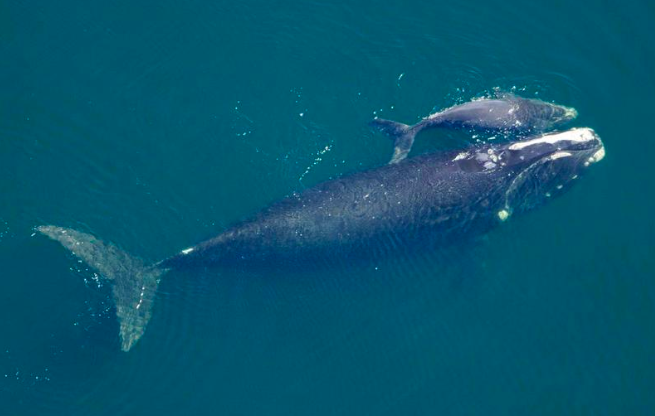
A North Atlantic right whale swims with her calf near the Florida/Georgia border where whales come every year to give birth. Photo: Associated Press
As part of their challenge to bar the government from drilling for oil and gas off the southeastern coast, a coalition of environmental groups asked a federal judge in South Carolina to force the government to suspend seismic airgun blast testing, which are used to deposits of oil and gas under the sea floor, until the case can be fully heard in court. They are challenging the government’s permits, which would allow for the drilling to harm and even possibly kill of a number of marine mammals, including the critically endangered North Atlantic right whale, which is on the verge of extinction.
In a statement, the groups allege a number of specific and serious harms caused by the testing, including that:
- The blasting ships would “concentrate their fire” on the world’s densest population of acoustically sensitive beaked whales off North Carolina’s Outer Banks
- Dolphins, whales and other animals could endure five million blasts as these companies seek offshore oil and gas deposits.
- The blasts will happen approximately every 10 seconds for weeks or months at a time.
- The government failed to consider the combined effects of overlapping and simultaneous surveys, which are greater than the effects of individual seismic-blasting boats.
- The government erroneously determined that only a “small number” of whales and dolphins would be harmed.
According to Georgia Public Radio News, the federal government could begin issuing permits for seismic testing in March. “This important issue deserves a fair day in court. We can’t let this dangerous activity cause a species to go extinct just so the oil industry can open our oceans to offshore drilling. Up and down the Atlantic coast, businesses, communities and bipartisan elected officials are overwhelmingly opposed to seismic airgun blasting. Every East Coast governor and over 90 percent of coastal municipalities in the blast zone are opposed to opening our coast to drilling – this is states versus President Trump,” said Diane Hoskins, campaign director at Oceana. “We are going to do everything in our power to stop this unlawful, irreparable and needless harm.”
This is part of a pattern of disregard for the marine environment by the Trump Administration. Another coalition of conservation groups yesterday sued several Federal agencies because they missed deadlines to list the Gulf of Mexico whale, a subspecies of the Bryde’s whale, as an endangered species, when there are fewer than fifty of this species of whales left.
Why This Matters: Let’s start with the most acute problem — there are only about 400 right whales remaining in the Atlantic and thus any harm to this species caused by the airgun blasts could have dire consequences. Especially now, when several new right whale calves have recently been spotted off the coast there. Moreover, sixteen South Carolina coastal communities and the South Carolina Small Business Chamber of Commerce are also part of the lawsuit to prevent seismic blasting, and a bi-partisan group of ten East Coast attorneys general, including South Carolina’s Alan Wilson, have joined it as well. Even in the heart of Trump country, drilling for oil and gas off the southeastern coast remains highly unpopular.
February 22, 2019 » beaked whales, dolphins, drilling, endangered, Georgia, Gulf of Mexico, marine mammals, North Atlantic Right Whale, Oceana, oil and gas, seismic, South Carolina, whale, whales


